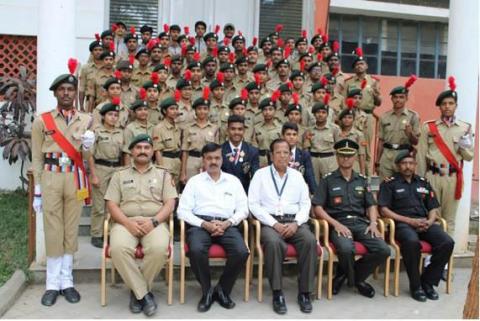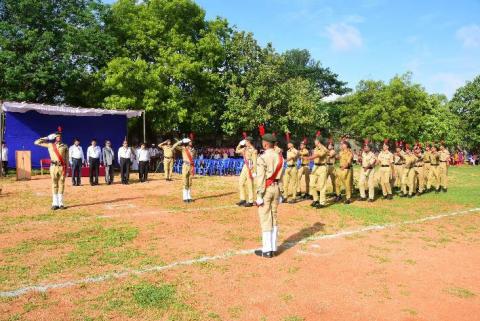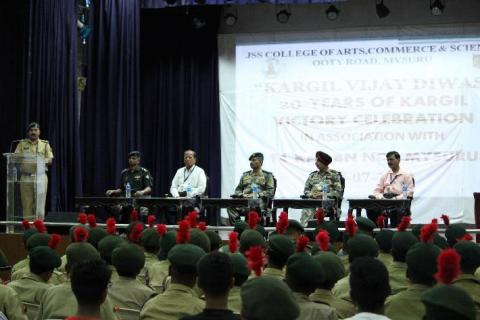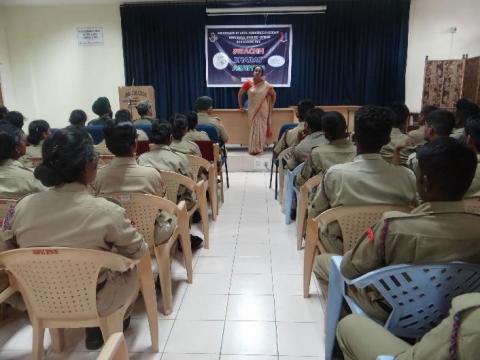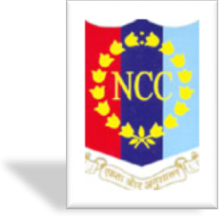
The National Cadet Corps is the Indian Military Cadet Corps with its Head Quarters at New Delhi. It is a voluntary organization which recruits cadets from high schools, colleges and Universities all over India. The Cadets are given basic military training in small arms and parades. The officers and cadets have no liability for active military service once they complete their course but are given preference over general candidates during selections based on the achievements in the corps.
MOTTO OF NCC
Unity and Discipline (Ekta aur Anushasan).DG’s FOUR CARDINAL PRINCIPLES OF DISCIPLINE
- Obey with a smile
- Be Punctual
- Work hard and without fuss
- Make no excuses and tell no lies
AIMS OF NCC
The aims of NCC as approved by Minister of Defence in March 2001 are as under:
- To develop character, comradeship, discipline, leadership, secular outlook, spirit of adventure, sportsmanship and ideals of selfless service among the youth of the country
- To create a human resource of organized, trained and motivated youth, to provide leadership in all walks of life and always be available for the service of the nation
- To provide a suitable environment to motivate the youth to take up a career in the Armed Forces
HISTORY OF NCC
The NCC in India was formed the National Cadet Corps Act of 1948. It was raised on 15 July 1948. The origin of NCC can be traced back to the ‘University Corps’, which was created under the Indian Defence Act 1917, with the objective to make up the shortage of the Army. In 1920, when the Indian Territorial Act was passed, the ‘University Corps’ was replaced by the University Training Corps (UTC). The aim was to raise the status of the UTC and make it more attractive to the youth. The UTC Officers and cadets dressed like the army. It was a significant step towards the Indianisation of armed forces. It was rechristened in the form of UOTC so the National Cadet Corps can be considered as a successor of the University Officers Training Corps (UOTC) which was established by the British Government in 1942. During World War II, the UOTC never came up to the expectations set by the British. This led to the idea that some better schemes should be formed, which could train more young men in a better way, even during peace. A committee headed by Pandit Hradaya Nath Kunjru recommended a cadet organization to be established in schools and colleges at a national level. The National Cadet Corps Act was accepted by the Governor General and on 15 July 1948 the National Cadet Corps came into existence.
In 1948, the Girls Division was raised in order to give equal opportunities to school and college going girls. The NCC was given an inter-service image in 1950 when the Air Wing was added, followed by the Naval Wing in 1952. Same year, the NCC curriculum was extended to include community development/social service activities as a part of the NCC syllabus at the behest of Late Pandit Jawaharlal Nehru who took keen interest in the growth of the NCC. Following the 1962 Sino-Indian War, to meet the requirement of the Nation, the NCC training was made compulsory in 1963. In 1968, the Corps was again made voluntary.
During Indo-Pakistani war of 1965 & Bangladesh-Pakistani war of 1971, NCC cadets were second line of defence. They organized camp to assist ordnance factories, supplying arms and ammunition to the front and also were used as patrol parties to capture enemy paratroopers. The NCC cadets also worked hand in hand with the Civil defence authorities and actively took part in rescue works and traffic control.
After 1965 and 1971 wars NCC syllabus was revised. Rather than just being second line of defence, NCC syllabus laid greater stress on developing quality of leadership and officer like qualities. The military training which the NCC cadets received was reduced and greater importance was given to other areas like social service and youth management.
NCC ORGANISATION
The NCC is headed by a Director General with the rank of lieutenant-general. He is assisted by two Additional Director Generals (A and B) of two-star rank (major-general, rear-admiral or air vice-marshal). Five Brigadier level officers and other civil officials also assist him. The Headquarters is located in Delhi. The organisational structure continues as follows:
- Directorate – There are 17 Directorates located in the state capitals headed by an officer of the rank of a Major General from the three Services.
- Group – Depending upon the size of the state and growth of NCC in the states, Directorates have up to 14 Group Headquarters under them through which they exercise their command and control of the organisation in the state. Each group is headed by an officer of the rank of Brigadier or equivalent known as Group Commander.
- Battalion- Each NCC Group Headquarters control 5-7 units commanded by Colonel/ Lt. Col or equivalent.
- Company – Each Battalion consists of companies which are commanded by the Associate NCC Officer (ANO) of the rank of lieutenant to major.
In all there are 95 Group Headquarters in the country who exercise control over a network of 667 Army Wing Units (including technical and girls unit), 60 Naval Wing Units and 61 Air Squadrons. There are two training establishments namely Officers Training School, Kamptee (Nagpur, Maharashtra) and Women Officers Training School, Gwalior.


The NCC flag for various units of the NCC was first introduced in 1951. The flag was of same pattern, colour and size as was used by various regiments of the Army. The only difference was that it had the NCC badge and unit designation placed in the centre. Later on it was felt that the flag should be in keeping with the inter-service character of the Corps. In 1954 the existing tricolour flag was introduced. The three colors in the flag depict the three services of the Corps, red for the Army, deep blue for the Navy and light blue for the Air Force. The letters NCC and the NCC crest in gold in the middle of the flag encircled by a wreath of lotus, give the flag a colourful look and a distinct identity.
NCC SONG
NCC Song Lyrics
Hum Sab Bharatiya Hain, Hum Sab Bharatiya Hain
Apni Manzil Ek Hai,
Ha, Ha, Ha, Ek Hai,
Ho, Ho, Ho, Ek Hai.
Hum Sab Bharatiya Hain.
Kashmir Ki Dharti Rani Hai,
Sartaj Himalaya Hai,
Saadiyon Se Humne Isko Apne Khoon Se Pala Hai
Desh Ki Raksha Ki Khatir Hum Shamshir Utha Lenge,
Hum Shamshir Utha Lenge.
Bikhre Bikhre Taare Hain Hum Lekin Jhilmil Ek Hai,
Ha, Ha, Ha, Ek Hai
Hum Sab Bharatiya Hai.
Mandir Gurudwaare Bhi Hain Yahan
Aur Masjid Bhi Hai Yahan
Girija Ka Hai Ghariyaal Kahin
Mullah ki Kahin Hai Ajaan
Ek Hee Apna Ram Hain, Ek hi Allah Taala Hai,
Ek Hee Allah Taala Hain, Raang Birange Deepak Hain Hum,
lekin Jagmag Ek Hai, Ha Ha Ha Ek Hai, Ho Ho Ho Ek Hai.
Hum Sab Bharatiya Hain, Hum Sab Bharatiya Hain.
RANKS IN SENIOR DIVISION
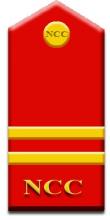 |
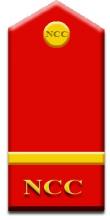 |
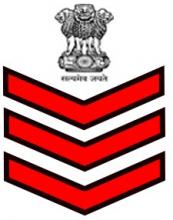 |
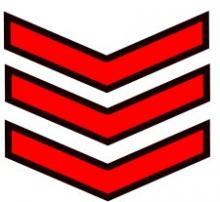 |
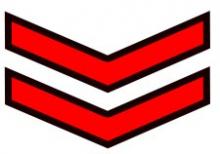 |
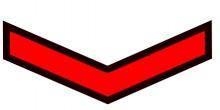 |
|
Cadet Senior |
Cadet |
Company Quarter Master Sergeant | Sergeant | Corporal | Lance Corporal |
EQUIVALENT RANKS IN SENIOR DIVISION NCC
|
Army wing |
Naval Wing |
Air wing |
|
Senior Under Officer |
Senior Cadet Caption |
Senior Under Officer |
|
Cadet Under Officer |
Junior Cadet Caption |
Cadet Under Officer |
|
Company Quarter Master Sergeant |
Petty Officer Sergeant Major |
Warrant Officer |
|
Sergeant |
Leader Cadet |
Sergeant |
|
Corporal |
Cadet Class I |
Corporal |
|
Lance Corporal |
Cadet Class II |
Leading Flight Cadet |
|
Cadet |
Cadet |
Cadet |
BASIC TRANING
- DRILL
- WEAPON TRAINING
- ADVENTURE TRAINING
- YOGA
- PHYSICAL TRAINING
- YOUTH EXCHANGE PROGRAMME
Certificates
Senior Division and Senior Wing:
- 'C'-Certificate is the highest recognition of training and qualification of a Senior NCC cadet.
- 'B'-Certificate is the initial recognition of training and qualification of a Senior NCC cadet.
Establishment of NCC in College:
The NCC Company 2/14 KAR BN NCC of JSS College of Arts, Commerce & Science., Mysore -25 was established in the year 1966 and strength of the company is 160 includes SD and SW. The company celebrated silver jubilee function during the year 1991-92. Since the beginning the company is training the cadets in a disciplined manner and contributing to the National unity and integrity through inculcation of NCC ideals.
In the beginning Major B. V. Shambashivaiah, Presently Chief executive of the College was looking after the NCC, later Major M.Mahadevappa, Presently Principal of the College and Capt. H.S.Nagendra Kumar were looking after the NCC. From 2015 onwards Lt. Dr. L Vinaykumar, Associate NCC officer looking after the company in the college.
One of the important achievements of the company is that from since 2011 cadets are continuously attending RD Parade in Delhi.
Training and Other Activities:
ACTIVITIES
- The activities of NCC can be broadly divided into the following distinct categories described below:-
- Institutional Training
- Camp Training
- Attachment Training
- Army/Naval/Air Wing Activities
- Youth Exchange Programme
- Community Development Programme cum Social Service Activities
- Adventure Training, Cycle Expedition, Trekking & Sports etc
- Foot Drill, Arms Drill & Weapons Training
- Self Defence
- Map Reading
NCC SOCIAL SERVICE ACTIVITIES
NCC has adopted community development activities with the aim of imbibing among the cadets selfless service to the community, dignity of labour importance of self help, need to protect the environment and to assist weaker sections of the society in their upliftment. This was envisaged through programmes involving
- Adult-education
- Tree plantation
- Blood donation
- Anti-Dowry Rally
- Anti-Female Infanticide Pledge
- Anti-Leprosy Drive
- AIDS Awareness Rally
- Visit to Old Age Homes
- Slum clearance
- Disaster Management & Relief
- Village upliftment and various other social schemes.
Activities in our college and achievements:
The total strength of the company of 2/14 KAR BN is 160 which includes both SD and SW cadets. The activities of the NCC units include parade training, coaching classes for ‘B’ and ‘C’ certificate examinations, rifle drill, and celebration of important national days, community service including visits to orphanages and old age homes and blood donation camps. We give more importance to personality development and social services.
Since from 2011, the cadets bring glory to the college by securing high pass percentage in the certificate examinations and by getting selection into the prestigious Republic Day Camp held at New Delhi.
Highlights:
CSUO Manju M U and SUO Karthik, cadet of NCC Army Wing, took part in the Republic Day Camp 2018 at New Delhi.
Staff Details:

Lt. Dr. L .VINAYKUMAR
ASSOCIATE NCC OFFICER
2/14 KAR BN NCC, MYSURU-25
Email:vinaykumarphy@gmail.com
Contact no: +91-9844583597
Activities photos

